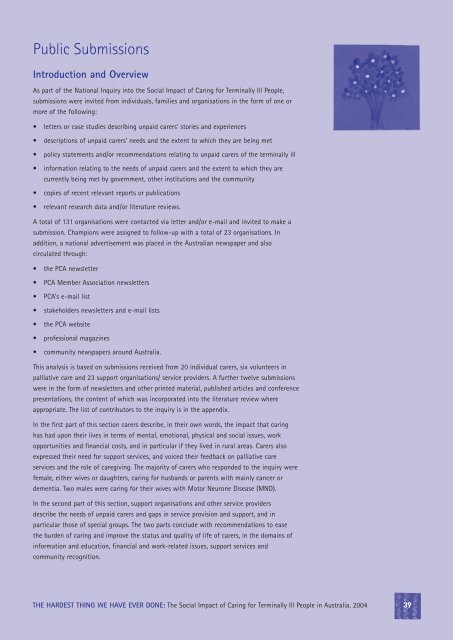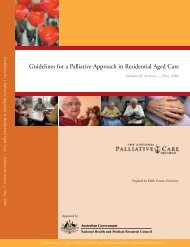The hardest thing we have ever done - Palliative Care Australia
The hardest thing we have ever done - Palliative Care Australia
The hardest thing we have ever done - Palliative Care Australia
You also want an ePaper? Increase the reach of your titles
YUMPU automatically turns print PDFs into web optimized ePapers that Google loves.
Public Submissions<br />
Introduction and Overview<br />
As part of the National Inquiry into the Social Impact of Caring for Terminally Ill People,<br />
submissions <strong>we</strong>re invited from individuals, families and organisations in the form of one or<br />
more of the following:<br />
• letters or case studies describing unpaid carers’ stories and experiences<br />
• descriptions of unpaid carers’ needs and the extent to which they are being met<br />
• policy statements and/or recommendations relating to unpaid carers of the terminally ill<br />
• information relating to the needs of unpaid carers and the extent to which they are<br />
currently being met by government, other institutions and the community<br />
• copies of recent relevant reports or publications<br />
• relevant research data and/or literature reviews.<br />
A total of 131 organisations <strong>we</strong>re contacted via letter and/or e-mail and invited to make a<br />
submission. Champions <strong>we</strong>re assigned to follow-up with a total of 23 organisations. In<br />
addition, a national advertisement was placed in the <strong>Australia</strong>n newspaper and also<br />
circulated through:<br />
• the PCA newsletter<br />
• PCA Member Association newsletters<br />
• PCA’s e-mail list<br />
• stakeholders newsletters and e-mail lists<br />
• the PCA <strong>we</strong>bsite<br />
• professional magazines<br />
• community newspapers around <strong>Australia</strong>.<br />
This analysis is based on submissions received from 20 individual carers, six volunteers in<br />
palliative care and 23 support organisations/ service providers. A further t<strong>we</strong>lve submissions<br />
<strong>we</strong>re in the form of newsletters and other printed material, published articles and conference<br />
presentations, the content of which was incorporated into the literature review where<br />
appropriate. <strong>The</strong> list of contributors to the inquiry is in the appendix.<br />
In the first part of this section carers describe, in their own words, the impact that caring<br />
has had upon their lives in terms of mental, emotional, physical and social issues, work<br />
opportunities and financial costs, and in particular if they lived in rural areas. <strong>Care</strong>rs also<br />
expressed their need for support services, and voiced their feedback on palliative care<br />
services and the role of caregiving. <strong>The</strong> majority of carers who responded to the inquiry <strong>we</strong>re<br />
female, either wives or daughters, caring for husbands or parents with mainly cancer or<br />
dementia. Two males <strong>we</strong>re caring for their wives with Motor Neurone Disease (MND).<br />
In the second part of this section, support organisations and other service providers<br />
describe the needs of unpaid carers and gaps in service provision and support, and in<br />
particular those of special groups. <strong>The</strong> two parts conclude with recommendations to ease<br />
the burden of caring and improve the status and quality of life of carers, in the domains of<br />
information and education, financial and work-related issues, support services and<br />
community recognition.<br />
THE HARDEST THING WE HAVE EVER DONE: <strong>The</strong> Social Impact of Caring for Terminally Ill People in <strong>Australia</strong>, 2004<br />
39
















